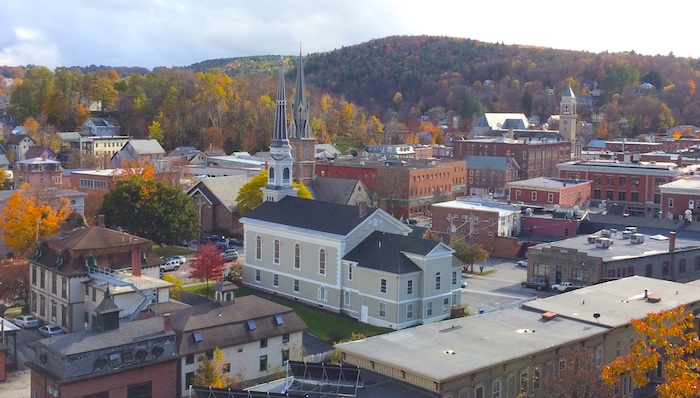By David Flemming
Carbon tax logic: If we make fossil fuels really painfully expensive it will force consumers to accept almost-but-quite-as-expensive alternatives that create no or little carbon emissions. But what happens when there is no alternative?
Such an example came up when Peter Walke of the Vermont Agency of Natural Resources, testifying before the House Energy and Technology Committee, recounted his own recent experience with a “green” public transportation alternative. Walke and his colleagues were using an electric bus to get around Montpelier. One day, the electric bus “had trouble getting up the National Life hill,” leaving several state employees stranded at work.

Montpelier, Vermont
Now, for those not familiar, the National Life hill might be considered a vigorous walk, but its well-paved, gradual incline is pretty tame compared to almost any other terrain in Vermont. This led several committee members to question the plausibility of adding such buses to Vermont’s fleet to service our rural areas, where they would have to travel over more challenging obstacles than that hill.
Speaker of the House Mitzi Johnson came to a similar conclusion in a December interview, when she explained her hesitancy to embrace a carbon tax when Vermonters don’t have readily available public transportation in rural areas. “Right now, no matter what you do to the pricing, there still are not a lot of ways to get from the Islands to Montpelier.”
Which gets us to the question: What happens when legislators create a tremendous amount of economic pain, but the consumer has nowhere to go to escape that pain? This is not creating an incentive — it’s inflicting torture. And, it doesn’t solve the problem of carbon emissions.
David Flemming is a policy analyst for the Ethan Allen Institute. Reprinted with permission from the Ethan Allen Institute Blog.



My heat pump article shows, the Comprehensive Energy Plan projections of numbers of heat pumps and energy reduction and CO2 reduction are BOGUS.
My biofuel article showed, the CEP projection of biofuel by 2050 is BOGUS.
http://www.windtaskforce.org/profiles/blogs/fact-checking-regarding-heat-pumps-in-vermont-and-maine
That means most of the CEP is BOGUS.
The VT-DPS heat pump study is a dense piece of obfuscation.
The info is there, but it is hard (for lay people and legislators) to make sense of.
After much effort, I was able to figure it out
I thought, gee, all that could have been covered in a much simpler manner.
I guess VT-DPS and its pro-heat pump consultant opted not to, in order to keep the scam going; part of VT – DPS “policy objectives”?
So, I wrote my article, which has been distributed to thousands.
A lot of folks have trouble understanding heat pumps, but they do understand refrigerators.
The compressor of a refrigerator cools the inside, and rejects heat to the outside.
Heat pumps do that in summer, but work in reverse in winter.
Generally, it is less costly to ONLY operate the traditional system starting at 8F to 10F, because of low coefficients of performance of the heat pumps, i.e., high kWh consumption per delivered Btu.
A COP = 1.0 is equivalent to electric heating.
Do that ON A COLD DAY, and your electric bill will skyrocket, which GMP loves
If a house is highly insulated/highly sealed (say 17000 Btu/h at -20F for a 2000 sq ft house), it uses very little energy and the annual cost is low.
Heat pumps can provide 100% of the heat for such houses, but do not provide much in ADDITIONAL savings compared with a traditional system
A non-electric back-up system, such as a propane stove or wood stove, is needed in case of a heat pump outage or power outage.
The TWO systems have costs for maintenance contracts and service calls.
The TWO systems have amortizing costs requiring annual payments for 15 years for the heat pump system (if it lasts that long), and for about 20 years for the traditional system.
It would be a major burden for households, if the state were to MANDATE heat pumps.
The most important thing to these people….To feel smart and morally superior. They are neither.
“…..there is still not a lot of ways to get from the islands to Montelier”. This quote from the speaker shows a lot about her mindset.
What about Brattleboro to Mt. Snow, Manchester to Stratton mountain, Bristol to Waitsfield? Rutland to Killington?
It’s not all me, me, me.
Never knew about ebus problems. Interesting. Thanks Dave.
Guy/Dave
Here is an evaluation of the MA electric school bus program.
Yes, it is a FLOP.
IT DID NOT SAVE ANY ENERGY COSTS
“V2G or V2B electric school bus systems is most likely not cost-effective at present”. See page 4 of 45
The house energy/enviro committee also has the inane urge to buy the same school buses, even though I wrote them about the MA flop.
It seems not to sink in they are throwing good money into a black hole.
Are they hoping for a different outcome in Vermont with hills and snowy roads?
Those buses would need 4-wheel drive.
https://www.mass.gov/files/documents/2018/04/30/Mass%20DOER%20EV%20school%20bus%20pilot%20final%20report_.pdf
Well stated but will they listen. I doubt it. These liberals have an agenda they want to achieve at any cost. After all, they know what’s best for all of us.